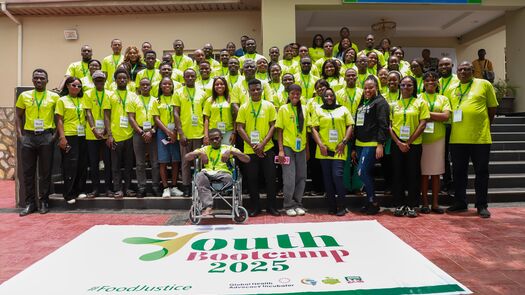November 25, 2025
Why we need to take communicable and noncommunicable diseases out of their silos to create a more resilient world
By Kyra Berasi
This essay appeared originally on the Global Health Council website.
In early February, the World Health Organization (WHO) held its annual Executive Board meeting to set the agenda for the upcoming World Health Assembly (WHA). At the start of the meeting, COVID-19 did not yet have a name. The gravity and scope of the novel coronavirus’s impact was still mostly unknown.
Yet even at that time, Dr. Tedros, the Director-General of the WHO, acknowledged that from the public’s perspective, the outbreak would mostly eclipse all other issues that the Executive Board was discussing. This proved to be true, including for noncommunicable diseases (NCDs) and their risk factors, such as issues related to nutrition and healthy food policies.
Although they did not make headlines, numerous healthy food issues were on the Executive Board meeting agenda – such as maternal, infant, and young child nutrition and food safety. Throughout the six-day meeting, member states and observers discussed nutrition labeling, digital marketing of unhealthy products, cross-border food safety issues, efforts to eliminate industrially produced trans fat, the double burdens of malnutrition and overweight and obesity, and more.

In the months since the Executive Board meeting, COVID-19 has significantly altered people’s lives across the globe. Schools are closed, people have lost their jobs, access to healthy and fresh food is limited, and people are sick. This disease is accentuating long-existing strains in health and food systems, social inequities, and the need for greater political leadership to enact and implement national public-health measures.
Soon, government officials and advocates will participate in the World Health Assembly (WHA), where – once again – the pressing issue of this pandemic will likely overshadow all other health topics, including NCDs. Knowing this, in the weeks leading up to the WHA, healthy food advocates should continue working to educate government officials about the deeply interrelated nature of communicable and noncommunicable diseases. At the Global Health Advocacy Incubator (GHAI), we see firsthand how these issues are connected. We work with partners around the world to support the advancement of healthy food policies, while also helping countries prepare for and prevent epidemics as part of the Resolve to Save Lives initiative.
Social inequities exacerbate both communicable diseases and NCDs in mutually reinforcing ways. Although often misunderstood as diseases of wealth, NCDs disproportionately affect low-income populations. Many low-income countries grapple with the challenge of epidemic preparedness and currently have inadequate systems in place. Imbalances in the social determinants of health create a deadly combination: populations with greater rates of underlying health conditions, such as diabetes, hypertension, and lung diseases, are also more likely to be exposed to dangerous pathogens. This is true generally, and it has proven to be a significant factor in who becomes severely ill from COVID-19.
During the current outbreak, health authorities are recommending that vulnerable individuals – such as people living with NCDs – be particularly vigilant about taking precautions. However, many of these precautions are only accessible to the wealthy, such as telework, social distancing, and nutritious diets. It does not have to be this way. Governments can reduce the impact of such inequities with appropriate regulations, including healthy food policies.
Before COVID-19, healthy food advocates in all regions of the world have been rallying for governments to step up and pass measures that protect their populations. GHAI works with partners around the globe who are calling on their governments to protect their communities and stand up to the food and beverage industry. For instance, advocates in Nigeria are calling for their government to eliminate industrially produced trans fat from the national food supply; partners in Barbados are pushing for measures that will create healthier school environments; civil-society groups in India are working to increase access to hypertension control; and groups in Colombia are calling for mandatory and easily understood front-of-package labels for unhealthy food and beverages. These advocates have known something that is overlooked far too often: healthy food policies are an integral component to strong health systems.
Efforts to enact healthy food regulations should not only continue during the COVID-19 outbreak; they should be accelerated to better protect the public health during this time of increased vulnerability. Proactive government policies, which are evidence-based and free from financial conflicts-of-interest, are more important now than ever.
All of the initiatives noted above are relevant as the world faces this pandemic, because they are designed to give populations better access to healthy food options and require the private sector to act more responsibly. The role of healthy school environment policies is a clear example. By enacting regulations to create healthier school environments, governments can ensure that all students have access to nutritious food and are protected against industry marketing practices on school premises. Regulating school food environments can help protect children from diet-related chronic diseases, which can also make them more resilient against communicable diseases. In such regulations, governments can include systems for providing food to students even if schools must close – as many have due to COVID-19. Doing so helps ensure that no student will become malnourished or forced to risk disease exposure due to food insecurity. As this example illustrates, the risk factors for communicable diseases and NCDs are interrelated, and the solutions should be, too.
It remains unclear when or in what format the WHA will be held this year, due to the ongoing pandemic. What can be expected is that at this meeting, COVID-19 will likely be a prominent topic – as it should be. Yet the global health community and national governments must not overlook other pressing health priorities, including healthy food policies. To create a stronger, more resilient world, let us take communicable and noncommunicable diseases out of their silos, so that we can create long-lasting and comprehensive solutions.
Kyra Berasi, legal advisor at the Global Health Advocacy Incubator, provides legal support across the organization’s healthy food policy programs.



